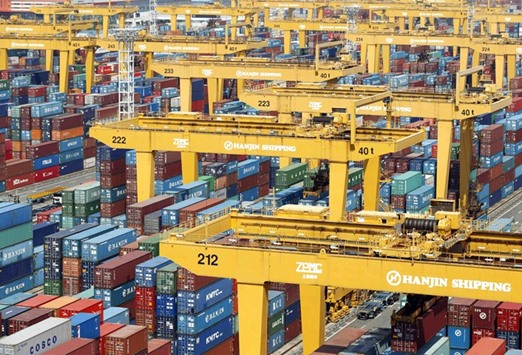Improved shipments of smartphones and steel in March helped South Korea post its slowest decline in exports for four months government data showed yesterday, but weakness in sales to China remained a worry for the world’s sixth largest exporter.
Exports in March fell by a less-than-expected 8.2% from a year earlier to $42.98bn, the ministry of trade, industry and energy said. It was the slowest fall in exports since November last year.
The ministry said steel exports had rebounded by 14.7% in March on-year, while shipments of smartphones had surged 19.9%, mainly thanks to the release of Samsung Electronics’ new Galaxy S7.
Imports dropped 13.8% to $33.16bn to result in a $9.82bn surplus, the ministry said. The fall in imports was the slowest since June.
The trade performance beat median forecasts for declines of 10.4% and 13.1% for exports and imports respectively in a Reuters survey of 17 analysts.
Despite the improvement, the data failed to remove analysts’ doubts about a rebound in global demand as the average export value per working day stood at $1.79bn in March, less than $1.82bn seen in February, Thomson Reuters calculations showed.
“I don’t think we’ve hit bottom and there is no way exports growth will turn positive this year when looking at the state of the global economy,” said June Park, economist at Daishin Economic Research Institute.
Exports to neighbouring China, South Korea’s biggest market, fell for a ninth straight month in March, the data showed. Shipments to the US fell again after posting a brief rise in February.
Oil products continued to place a drag on exports as they plunged 41.6% last month in annual terms. The trade ministry said oil products, petrochemical goods and ships accounted for 69% of the exports decline in March.
Park said poor demand from China would keep dragging down exports.
With exports plunging from last year, the economy is now leaning on the sole crutch of domestic consumption, which has been showing a fragile recovery.
Many market participants expect the Bank of Korea to reduce its policy interest rate from an already record low of 1.50% in a bid to boost the economy, and possibly weaken the won currency.
The won strengthened 8.2% against the dollar in March, posting its biggest monthly gain in seven years as it rebounded after sharp falls earlier in the year. Unlike many others, Park doubted whether the central bank would cut rates at the upcoming policy review on April 19.
“Looking at recent policymakers’ upbeat comments, it looks like a hold in April. But if they do hold, it will be because the BoK feels a rate cut will have little effect right now,” he said. The BoK chief has been sceptical in recent months over the effectiveness of rate cuts, though chances of a significant fiscal stimulus also appears some way off as the finance minister has said there is no need for a supplementary budget at this point.
Meanwhile, separate data showed March inflation eased to 1% in annual terms, slowing from February but higher than January this year.

Hanjin Shipping’s container terminal is seen at the Busan New Port. South Korea’s exports in March fell by a less-than-expected 8.2% from a year earlier to $42.98bn, the ministry of trade, industry and energy said yesterday.
